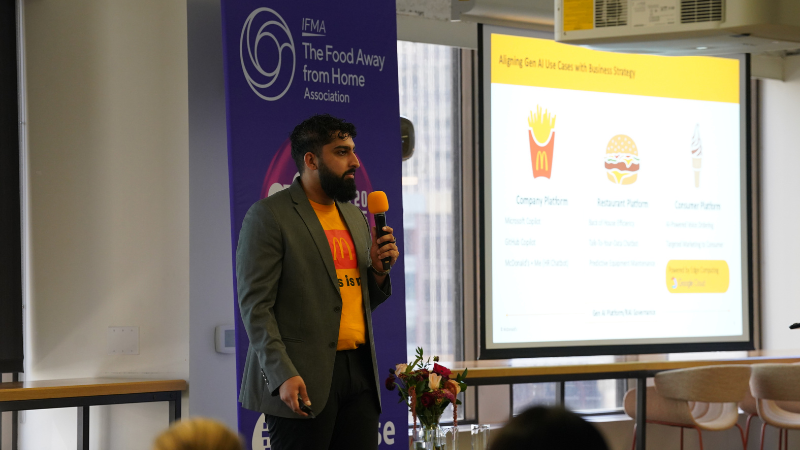
CHICAGO, August 7, 2025 - The discussion of AI’s potential shifted from the theoretical to the practical during Day Two of Go2MarketEdge, hosted by Instacart. Speakers from operations ranging from McDonald’s to Nestlé Professional Solutions highlighted benefits they’re already reaping from the technology.
Go2MarketEdge, a new sort of industry event, was designed to provide marketing and sales leaders in the food-away-from-home business with an immersion in the latest technology for the field. With that mission, much of the focus fell on AI and what it could mean for the industry.
A discussion of the potential shifted on the second day of the San Francisco event to the impact already being felt.
Fleur Veldhoven, VP of Marketing-Culinary for Nestlé’s foodservice operations, revealed that AI has saved employees of the company an average of 45 minutes per week. "Across 44,000 employees, that’s huge,” said Veldhoven, chairperson of the event.
She recounted how the supplier had traditionally responded to a customer’s request to have a product developed for them. “Our marketers and chefs pulled together 40 concepts,” she explained. “Traditionally we’d go into this funnel process that would take weeks and weeks of discussion. We’d have 40 product lines and go into 40 concepts.”
With AI, “before we even reach customer interaction, we have choice-making,” she continued. And because of the caliber of what AI produced, “we have confidence behind the choices.”
Nestlé is putting “a lot more investment in snacking, portioning, different packaging, and being where the consumer wants to experience food and beverage,” said Veldhoven. “We are absolutely embracing AI and technology to make us stronger in that space.”
Kerry is another company that has seen the product development process shortened, said Amy Devitt, Senior Activation Market Manager for the flavorings and nutritional ingredients producer.
“Back in the day, when you had that customer brief land in your inbox [for a development project], you’d have to reach out to your culinary partners, your marketing partners,” and a host of other colleagues with a stake in the process, said Devitt. “You’d wait a week to get your schedules together.”
Then would come a host of meetings, product testing, and signoffs by all the departments involved, she continued.
“With this new tool,” she remarked, “you can punch it in and have an answer literally in minutes... I can comfortably say our AI is cutting back the process by weeks.”
The process also provides key questions that can take precious time to answer, and not always with certainty. “Can we actually make this [product]? Is it scalable? Is it feasible?” she explained.
McDonald’s: ‘Engineering feel-good moments’
The world’s largest restaurant chain is using AI on at least three fronts, said Nickhil Tekwani, the chain’s Manager of General AI/Machine Language Engineering: corporate administration, unit-level management, and customer interaction with the brand.
Speaking at a session hosted in the headquarters of Instacart, the food delivery company, Tekwani described them as three areas with “near-term realizable Gen[erative] AI value.”
Despite that seemingly deep involvement, McDonald’s painstakingly weighs the implications of an AI venture before giving it a greenlight, Tekwani stressed. First and foremost, he says, it has to align with McDonald’s definition of its core business role as generating feel-good moments. And they’re serious about that, he indicated.
Indeed, Tekwani defines his department’s role as “engineering feel-good moments,” not saving money, time, or labor, though those benefits can look potentially huge to outsiders.
To protect one of the world’s strongest and most valuable brands, any change of significance for McDonald’s has to win the support of every department involved in it, Tekwani revealed. “If we’re getting too much pushback, we might have to rethink where we’re going,” said Tekwani.
His comments suggested that McDonald’s isn’t galloping into a science-fiction-like reliance on AI. His presentation included a slide reading, “You can’t always force AI-native workflows into daily habits.”
He gently chided the media for fostering an impression that AI is managing far more at a company like McDonald’s than the reality attests. Truly “agentic” implementations are further away than the media makes it seem,” said Tekwani. “You always need a human.”
Day two of Go2MarketEdge was hosted by Instacart at their San Francisco headquarter. The event is presented by IFMA The Food Away from Home Association in partnership with the tech companies Tastewise and Cut+Dry. The conference runs through Thursday, August 7 in San Francisco, with the sessions held in a variety of high-tech facilities like the headquarters of Instacart. The event was designed to be an immersive experience, with attendees seeing tech’s latest advances in action.
FAFH professionals who missed the conference can still explore the near-term future of marketing and sales technology via a companion virtual version of Go2MarketEdge that begins August 12, 2025. In a series of sessions that participants can “attend” via their desktop computers, participants will get a recap of the San Francisco event, plus new content tailored to the remote format.
More information on the virtual version is available here.
As Managing Editor for IFMA The Food Away from Home Association, Romeo is responsible for generating the group's news and feature content. He brings more than 40 years of experience in covering restaurants to the position.